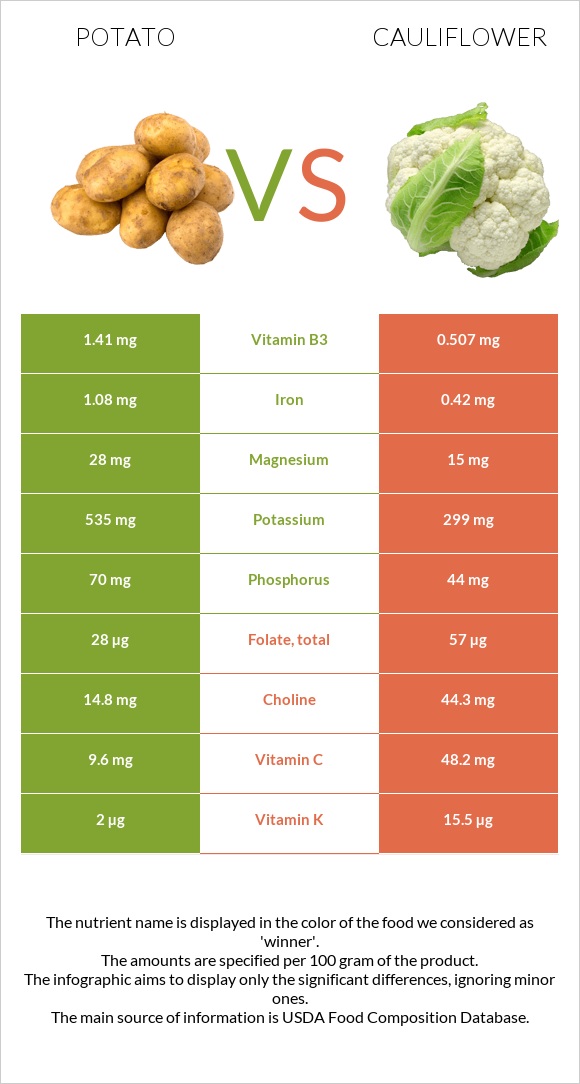Potato vs. Cauliflower — In-Depth Nutrition Comparison
Compare
How are potatoes and cauliflower different?
- Potatoes are higher in vitamin B6, copper, iron, potassium, and vitamin B3; however, cauliflower is richer in vitamin C, vitamin K, folate, vitamin B5, and choline.
- Daily need coverage for vitamin C for cauliflower is 43% higher.
- Potatoes contain 3 times more copper than cauliflower. While potatoes contain 0.118mg of copper, cauliflower contains only 0.039mg.
Potatoes, baked, flesh, and skin, without salt and Cauliflower, raw are the varieties used in this article.
Infographic

Infographic link
Mineral Comparison
Mineral comparison score is based on the number of minerals by which one or the other food is richer. The "coverage" charts below show how much of the daily needs can be covered by 300 grams of the food.
| Contains more MagnesiumMagnesium | +86.7% |
| Contains more PotassiumPotassium | +78.9% |
| Contains more IronIron | +157.1% |
| Contains more CopperCopper | +202.6% |
| Contains more ZincZinc | +33.3% |
| Contains more PhosphorusPhosphorus | +59.1% |
| Contains less SodiumSodium | -66.7% |
| Contains more ManganeseManganese | +41.3% |
| Contains more CalciumCalcium | +46.7% |
| Contains more SeleniumSelenium | +50% |
Vitamin Comparison
Vitamin comparison score is based on the number of vitamins by which one or the other food is richer. The "coverage" charts below show how much of the daily needs can be covered by 300 grams of the food.
| Contains more Vitamin AVitamin A | +∞% |
| Contains more Vitamin B1Vitamin B1 | +28% |
| Contains more Vitamin B3Vitamin B3 | +178.1% |
| Contains more Vitamin B6Vitamin B6 | +69% |
| Contains more Vitamin CVitamin C | +402.1% |
| Contains more Vitamin EVitamin E | +100% |
| Contains more Vitamin B2Vitamin B2 | +25% |
| Contains more Vitamin B5Vitamin B5 | +77.4% |
| Contains more Vitamin KVitamin K | +675% |
| Contains more FolateFolate | +103.6% |
All nutrients comparison - raw data values
| Nutrient |  |
 |
DV% diff. |
| Vitamin C | 9.6mg | 48.2mg | 43% |
| Vitamin K | 2µg | 15.5µg | 11% |
| Vitamin B6 | 0.311mg | 0.184mg | 10% |
| Copper | 0.118mg | 0.039mg | 9% |
| Iron | 1.08mg | 0.42mg | 8% |
| Potassium | 535mg | 299mg | 7% |
| Starch | 17.27g | 7% | |
| Folate | 28µg | 57µg | 7% |
| Vitamin B3 | 1.41mg | 0.507mg | 6% |
| Vitamin B5 | 0.376mg | 0.667mg | 6% |
| Carbs | 21.15g | 4.97g | 5% |
| Choline | 14.8mg | 44.3mg | 5% |
| Phosphorus | 70mg | 44mg | 4% |
| Calories | 93kcal | 25kcal | 3% |
| Magnesium | 28mg | 15mg | 3% |
| Manganese | 0.219mg | 0.155mg | 3% |
| Protein | 2.5g | 1.92g | 1% |
| Calcium | 15mg | 22mg | 1% |
| Fiber | 2.2g | 2g | 1% |
| Zinc | 0.36mg | 0.27mg | 1% |
| Sodium | 10mg | 30mg | 1% |
| Vitamin B1 | 0.064mg | 0.05mg | 1% |
| Vitamin B2 | 0.048mg | 0.06mg | 1% |
| Fructose | 0.34g | 0.97g | 1% |
| Fats | 0.13g | 0.28g | 0% |
| Net carbs | 18.95g | 2.97g | N/A |
| Sugar | 1.18g | 1.91g | N/A |
| Vitamin A | 1µg | 0µg | 0% |
| Vitamin E | 0.04mg | 0.08mg | 0% |
| Selenium | 0.4µg | 0.6µg | 0% |
| Saturated fat | 0.034g | 0.13g | 0% |
| Monounsaturated fat | 0.003g | 0.034g | 0% |
| Polyunsaturated fat | 0.057g | 0.031g | 0% |
| Tryptophan | 0.025mg | 0.02mg | 0% |
| Threonine | 0.081mg | 0.076mg | 0% |
| Isoleucine | 0.08mg | 0.071mg | 0% |
| Leucine | 0.119mg | 0.106mg | 0% |
| Lysine | 0.13mg | 0.217mg | 0% |
| Methionine | 0.038mg | 0.02mg | 0% |
| Phenylalanine | 0.099mg | 0.065mg | 0% |
| Valine | 0.125mg | 0.125mg | 0% |
| Histidine | 0.042mg | 0.056mg | 0% |
| Omega-3 - ALA | 0.015g | N/A | |
| Omega-6 - Linoleic acid | 0.013g | N/A |
Macronutrient Comparison
Macronutrient breakdown side-by-side comparison
Protein:
2.5 g
Fats:
0.13 g
Carbs:
21.15 g
Water:
74.89 g
Other:
1.33 g
Protein:
1.92 g
Fats:
0.28 g
Carbs:
4.97 g
Water:
92.07 g
Other:
0.76 g
| Contains more ProteinProtein | +30.2% |
| Contains more CarbsCarbs | +325.6% |
| Contains more OtherOther | +75% |
| Contains more FatsFats | +115.4% |
| Contains more WaterWater | +22.9% |
Fat Type Comparison
Fat type breakdown side-by-side comparison
Saturated fat:
Sat. Fat
0.034 g
Monounsaturated fat:
Mono. Fat
0.003 g
Polyunsaturated fat:
Poly. Fat
0.057 g
Saturated fat:
Sat. Fat
0.13 g
Monounsaturated fat:
Mono. Fat
0.034 g
Polyunsaturated fat:
Poly. Fat
0.031 g
| Contains less Sat. FatSaturated fat | -73.8% |
| Contains more Poly. FatPolyunsaturated fat | +83.9% |
| Contains more Mono. FatMonounsaturated fat | +1033.3% |
Carbohydrate type comparison
Carbohydrate type breakdown side-by-side comparison
Starch:
17.27 g
Sucrose:
0.4 g
Glucose:
0.44 g
Fructose:
0.34 g
Lactose:
0 g
Maltose:
0 g
Galactose:
0 g
Starch:
0 g
Sucrose:
0 g
Glucose:
0.94 g
Fructose:
0.97 g
Lactose:
0 g
Maltose:
0 g
Galactose:
0 g
| Contains more StarchStarch | +∞% |
| Contains more SucroseSucrose | +∞% |
| Contains more GlucoseGlucose | +113.6% |
| Contains more FructoseFructose | +185.3% |
~equal in
Lactose
~0g
~equal in
Maltose
~0g
~equal in
Galactose
~0g





